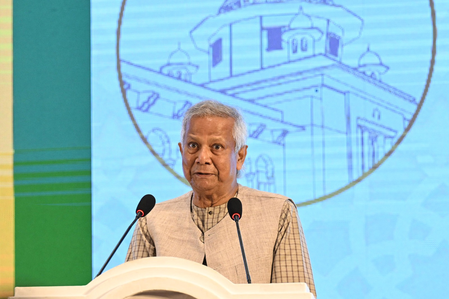
Dhaka, Aug 3 (IANS) Bangladesh’s Chief Adviser, Muhammad Yunus, has installed himself atop an “interim government” through backdoor deals with deep-state actors and foreign sponsors. Without any constitutional mandate, Yunus now governs through secrecy, which has resulted in a covert Non-Disclosure Agreement (NDA) with the US.
Bangladesh has surrendered its defence independence, abandoned key allies, and agreed to a one-sided alliance that compromises the sovereignty of the nation in exchange for a modest tariff reduction, NorthEast News reported. Under this tariff reduction arrangement, the Yunus-led administration has entered into an NDA that bans Bangladesh from purchasing military equipment from its defence partners, China and Russia. It is not a diplomatic alignment between two nations but a unilateral surrender of strategic flexibility, signed in silence, and being termed as a victory, according to the report.
Recently, US Charge d’Affaires Tracey Ann Jacobson visited the Armed Forces Division in Dhaka, the report said, citing multiple credible sources. During a closed-door meeting with the Principal State Officer, Jacobson has reportedly given an ultimatum that continuing military deals with Russia or China would lead to sanctions against the Bangladesh Armed Forces. Yunus was also given a similar warning.
Bangladesh’s military, which comprises the Army, Air Force and Navy, is fundamentally structured around defence technologies of Russia and China, according to the report. A large portion of Bangladesh’s defence apparatus would collapse if China or Russia decide to stop military assistance, spare parts or logistical support to Bangladesh in response to the betrayal.
With this move, Bangladesh’s interim government has placed the entire military at the mercy of geopolitical retaliation. The interim government’s decision not only affects the defence. However, the economic implications of the move are equally catastrophic. Bangladesh’s key industries, particularly garments, depend on Chinese inputs. Furthermore, Chinese supply chains are the arteries of Bangladesh’s economic life. Shifting its stance towards the US would trigger retaliatory trade responses from China that could disrupt production, fuel inflation, or even precipitate a supply crisis in Bangladesh.
Yunus-led administration has taken this decision to buy 25 Boeing aircraft at increased prices, and purchase overpriced wheat from the US under bundled agreements. The interim administration has traded strategic autonomy for transactional subservience, the report said. Earlier, Bangladesh maintained a delicate but effective balance in its foreign ties. Former Bangladesh Sheikh Hasina-led government maintained ties with India, while having parallel relations with China, Russia and the US.
In just one year of administration, the Yunus regime has shifted Bangladesh’s stance from its carefully structured non-alignment, collapsing the nation into a one-dimensional client state. The NDA does not showcase a shift in alliance but demonstrates annihilation of choice, as per the report. The NDA reduces Bangladesh’s military to a dependent appendage, its economy to a hostage of external goodwill and its sovereignty to a bargaining chip in another country’s strategic ledger. This is not a policy failure but a national betrayal and implies willful dismantling of sovereignty, sealed with ink and branded as victory.
–IANS
int/akl/uk




